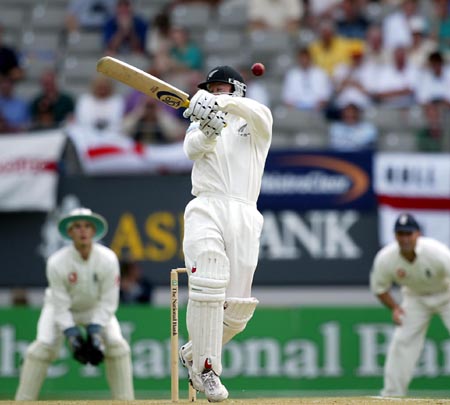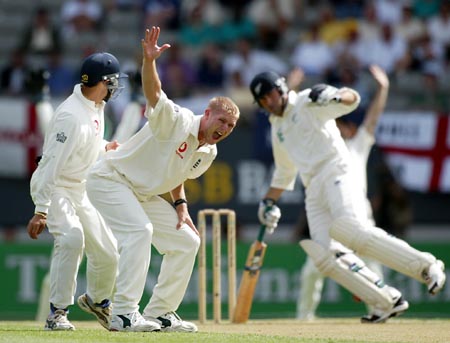England in New Zealand, 2001-02
Lawrence Booth

| |||
England's increasingly polished performances over the winter lost a coat of varnish on the final afternoon of their travels, when they went down to their first Test defeat in New Zealand for 18 years. The result left the series tied at 1-1: not bad against a side that had given Australia a run for their dollars a few months earlier, but an anticlimax after England had bossed the show until the third evening of the Third Test. They had missed a gilt-edged chance to exact revenge - for their defeat at home to New Zealand in 1999 and for the nail-biting 3-2 loss in the one-day series that preceded the Tests. The lack of ruthlessness that cost England a series win over Pakistan in 2001 again proved fatal.
If the players were physically exhausted after six months' jetting between England, Zimbabwe, India and New Zealand, they flew home with their emotions in tatters too. News arrived during the Second Test that Ben Hollioake, a popular team-mate throughout the winter programme of 16 one-day internationals, had been killed in a car crash in Perth, after an evening out with his family. It would be wrong to speculate on just how much this tragedy affected England's cricket, but their step lost the spring that had helped them bounce back from bad defeats in the first two one-dayers and then win the First Test. The tour ended in disappointment and in grief.
The two-month trip was split into two parts. An entertaining one-day series, which boiled down to a winner-takes-all clash at Dunedin, whetted the appetite, but it was the Tests which really got the juices flowing. The psychological sparring in the build-up provided a taste of things to come. Nasser Hussain declared that the 1999 series had been England's for the taking, only for Stephen Fleming to accuse England of not giving New Zealand credit for that victory. And when Chris Cairns joined in by declaring that England's Class of '99 had "disrespected" New Zealand, it was clear the days of Kiwi deference to the mother country were long gone.
England, too, were unwilling to kowtow. They grabbed the First Test by the scruff before Nathan Astle's unforgettable double-century nearly wrenched it from their grasp. Then New Zealand were forced to bat out most of the final day to save the Second Test, and when they were 19 for four in the opening session of the last, England were on course for a third successive 2-0 win here. Fleming's mantra, though, was that his side were at their best when desperate. His point, borne out by their dashing victory in the decisive one-day international, was reinforced in the Third Test, where Chris Harris, Daryl Tuffey and the Eden Park floodlights conspired to deny England their first Test series win since Sri Lanka 12 months earlier.
The use of lights to extend play into the evening and make up for lost time - now obligatory if the lights are there - was not the only innovation to make an impact on the series. The national obsession with rugby union meant that several stadiums hosted both sports, so New Zealand Cricket decided to solve the problem of stud marks on a length by installing drop-in pitches for the Tests at Christchurch and Auckland. They behaved unpredictably. Christchurch was like a normal wicket in reverse, flattening out as the game wore on, while Auckland turned into something of a lottery: early dampness meant that the ball left pronounced pitch-marks, which hardened up as the sun came out. Hussain likened the effect to corrugated iron. But, as long as rugby paid the bills, cricket had little choice.
| England, too, were unwilling to kowtow. They grabbed the First Test by the scruff before Nathan Astle's unforgettable double-century nearly wrenched it from their grasp. Then New Zealand were forced to bat out most of the final day to save the Second Test, and when they were 19 for four in the opening session of the last, England were on course for a third successive 2-0 win here. Fleming's mantra, though, was that his side were at their best when desperate | |||
The two sides were not just evenly matched, but also had a similar feel. Each had a thoughtful, energetic and well-respected captain, and each was missing a strike bowler (Darren Gough aggravated a knee injury towards the end of a typically effervescent performance in the one-day series but would not have been considered anyway after opting out of the Tests in India, while Shane Bond picked up a stress fracture of the foot on the eve of the one-dayers). Each side also had a tendency to collapse when the pressure was on. And each placed the team ethic ahead of individual glory. If the cricket was not always top-class, it was never third-rate.
New Zealand's injury worries ran deeper than England's, and it was their seam attack that suffered most. Dion Nash, a star on their 1999 tour to England, had not recovered after picking up an injury in Australia, while Cairns tore a muscle in his right knee during the Christchurch Test and missed the chance to add to his three wickets in the first hour of the series. And while New Zealand did not unearth a consistently dangerous new-ball replacement until Tuffey took nine wickets at Auckland, England had a locally born star of their own. After a slow start to the tour - he was savaged in a warm-up game by the pinch-hitter Simon Doull and left out of the last four one-day internationals - Andy Caddick was comfortably the most incisive bowler on either side. An irresistible burst on the first morning at Auckland made him the ninth England bowler to reach 200 Test wickets, and his series haul of 19 at less than 20 should have been the difference between the sides.
While Caddick and the bustling Matthew Hoggard (17 wickets at 23) enjoyed the uneven bounce and lavish early movement, the top-order batsmen did not. None of the first three on either side averaged 30, and it was left to the middle order to provide the memorable batting. At Christchurch, Hussain gave a masterclass in bad-wicket grafting, Graham Thorpe and Andrew Flintoff brought New Zealand's bowlers to their knees, and Astle brought the crowd to their feet. At Wellington, Flintoff flexed his muscles to terrifying effect. At Auckland, Chris Harris quietly and quirkily drove England mad, before Astle and Craig McMillan shone under the lights, to say nothing of the moon.
But in a country where mountains and lakes, ravines and fjords lurk round every corner, not everyone was in the mood to appreciate the scenery. Mark Ramprakash and Michael Vaughan paid the price for over-attacking, and Marcus Trescothick, who complained about burn-out during the match against Otago, endured the first extended slump of his England career, making four ducks in 11 international innings. Trescothick was given the additional burden of replacing James Foster behind the stumps for the last four one-dayers - a move designed to eliminate a weakness, which ended up compromising a strength.
It was a bad time to be a wicket-keeper. When Foster returned for the Test series, he seemed to have a blind spot to his left. Chris Nevin had a shaky one-day series for New Zealand, while Adam Parore was below his best in the Tests and retired from the game after the win at Auckland. So it was ironic that the only keeper to enhance his reputation didn't even play an international match: Warren Hegg returned home with a full set of brownie points after spending much of his time working with Foster in the nets.

| |||
There were full marks too - from the locals at least - for the Barmy Army, the eclectic English band of seasoned travelling fans, back-packers and opportunistic hangers-on. Their football-style chants provided virtually all the atmosphere at the half-empty Test grounds, and wound Fleming up to the extent that he was unable to resist a friendly-but-prickly dig at them in his end-of-series speech. The New Zealand board attempted to stage-manage a home-grown response, although the Mad Caps were neither loud nor numerous enough to compete. But the biggest - and most unearthly - sound of the tour came during the one-day international at Wellington, where Peter Jackson, the New Zealand-born director of The Lord of the Rings, supervised the crowd in creating battle-scene noises for the second of the trilogy, The Two Towers.
The never-say-die attitude instilled by Hussain and Duncan Fletcher was most in evidence during the one-day series. When England were dismissed for 89 to go 2-0 down at Wellington, one local newspaper columnist described them as "a sad joke", but in the next game at Napier, Hussain gave the same eleven the chance to provide their own punchline. They issued the perfect riposte, then squared the series at Auckland to threaten an instant replay of their one-day fightback in India, until a blistering hundred from Astle settled matters.
One question that remained unanswered was whether Hussain should be batting at No. 3 in the one-day side. In the Tests he had continued the renaissance that had begun when he returned from his umpteenth broken finger in August 2001, resolving to attack more. But a one-day series of 129 runs at a strike-rate of only 60.56 was not enough to silence the media mutterings.
It was not the only festering sore in the England camp. Following the draw against Otago, Fletcher admitted he was not happy with the fitness of some of the players who had arrived after the one-day series. No names were mentioned, but the finger of suspicion was pointed immediately at Jimmy Ormond and Usman Afzaal. The British tabloids went to town, and Ormond cut a forlorn - if not very svelte - figure for the rest of the tour.
The cricket, though, will be remembered for one innings. Astle's 222 off 168 balls at the end of the First Test was a once-in-a-lifetime cocktail of daring, power, wit and wonder. It combined the violence of Botham, the swagger of Viv and the precision of Tendulkar. Seven days later came the news of Ben Hollioake, and adrenalin turned to tears. It was a tour where the cricket briefly touched Olympian heights, but where, ultimately, the cricket didn't matter.
Match reports for
Tour Match: Northern Districts v England XI at Hamilton, Feb 8, 2002
Scorecard
Tour Match: Northern Districts v England XI at Hamilton, Feb 10, 2002
Scorecard
1st ODI: New Zealand v England at Christchurch, Feb 13, 2002
Report |
Scorecard
2nd ODI: New Zealand v England at Wellington, Feb 16, 2002
Report |
Scorecard
3rd ODI: New Zealand v England at Napier, Feb 20, 2002
Report |
Scorecard
4th ODI: New Zealand v England at Auckland, Feb 23, 2002
Report |
Scorecard
5th ODI: New Zealand v England at Dunedin, Feb 26, 2002
Report |
Scorecard
Tour Match: Otago v England XI at Queenstown, Mar 2-4, 2002
Scorecard
Tour Match: Canterbury v England XI at Christchurch, Mar 7-9, 2002
Scorecard
1st Test: New Zealand v England at Christchurch, Mar 13-16, 2002
Report |
Scorecard
2nd Test: New Zealand v England at Wellington, Mar 21-25, 2002
Scorecard
3rd Test: New Zealand v England at Auckland, Mar 30-Apr 3, 2002
Report |
Report |
Scorecard

